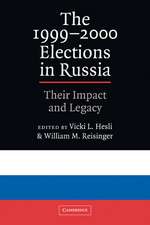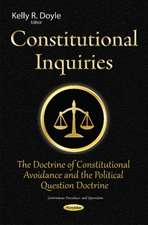Comparing Political Communication: Theories, Cases, and Challenges: Communication, Society and Politics
Editat de Frank Esser, Barbara Pfetschen Limba Engleză Paperback – 5 sep 2004
| Toate formatele și edițiile | Preț | Express |
|---|---|---|
| Paperback (1) | 269.19 lei 6-8 săpt. | |
| Cambridge University Press – 5 sep 2004 | 269.19 lei 6-8 săpt. | |
| Hardback (1) | 459.57 lei 6-8 săpt. | |
| Cambridge University Press – 5 sep 2004 | 459.57 lei 6-8 săpt. |
Din seria Communication, Society and Politics
-
 Preț: 192.21 lei
Preț: 192.21 lei -
 Preț: 188.94 lei
Preț: 188.94 lei -
 Preț: 207.35 lei
Preț: 207.35 lei -
 Preț: 227.23 lei
Preț: 227.23 lei -
 Preț: 204.48 lei
Preț: 204.48 lei -
 Preț: 388.16 lei
Preț: 388.16 lei - 11%
 Preț: 568.81 lei
Preț: 568.81 lei -
 Preț: 173.02 lei
Preț: 173.02 lei -
 Preț: 204.56 lei
Preț: 204.56 lei -
 Preț: 230.51 lei
Preț: 230.51 lei -
 Preț: 209.78 lei
Preț: 209.78 lei -
 Preț: 267.61 lei
Preț: 267.61 lei -
 Preț: 269.58 lei
Preț: 269.58 lei -
 Preț: 203.50 lei
Preț: 203.50 lei -
 Preț: 229.74 lei
Preț: 229.74 lei -
 Preț: 206.29 lei
Preț: 206.29 lei -
 Preț: 266.47 lei
Preț: 266.47 lei -
 Preț: 273.89 lei
Preț: 273.89 lei -
 Preț: 326.70 lei
Preț: 326.70 lei -
 Preț: 252.03 lei
Preț: 252.03 lei -
 Preț: 289.01 lei
Preț: 289.01 lei -
 Preț: 267.61 lei
Preț: 267.61 lei -
 Preț: 226.68 lei
Preț: 226.68 lei - 11%
 Preț: 558.08 lei
Preț: 558.08 lei -
 Preț: 265.70 lei
Preț: 265.70 lei -
 Preț: 288.04 lei
Preț: 288.04 lei -
 Preț: 313.10 lei
Preț: 313.10 lei - 11%
 Preț: 646.80 lei
Preț: 646.80 lei
Preț: 269.19 lei
Nou
Puncte Express: 404
Preț estimativ în valută:
51.51€ • 53.78$ • 42.63£
51.51€ • 53.78$ • 42.63£
Carte tipărită la comandă
Livrare economică 04-18 aprilie
Preluare comenzi: 021 569.72.76
Specificații
ISBN-13: 9780521535403
ISBN-10: 0521535409
Pagini: 438
Ilustrații: 2 tables
Dimensiuni: 152 x 229 x 25 mm
Greutate: 0.58 kg
Editura: Cambridge University Press
Colecția Cambridge University Press
Seria Communication, Society and Politics
Locul publicării:New York, United States
ISBN-10: 0521535409
Pagini: 438
Ilustrații: 2 tables
Dimensiuni: 152 x 229 x 25 mm
Greutate: 0.58 kg
Editura: Cambridge University Press
Colecția Cambridge University Press
Seria Communication, Society and Politics
Locul publicării:New York, United States
Cuprins
1. Introduction Barbara Pfetsch and Frank Esser; Part I. Theories and Methods: 2. Americanization, globalization, and secularization: understanding the convergence of media systems and political communication Daniel C. Hallin and Paolo Mancini; 3. Transnational trends in political communication: conventional views and new realities David L. Swanson; 4. Comparing mass communication systems: media formats, media contents, and media processes Hans J. Kleinsteuber; 5. Designs and methods of comparative political communication research Werner Wirth and Steffen Kolb; Part II. Cases: 6. Global political communication: good governance, human development and mass communication Pippa Norris; 7. Local political communication: media and local publics in the age of globalization Sabine Lang; 8. Strategic political communication: mobilizing public opinion in 'audience democracies' Hanspeter Kriesi; 9. Political campaign communication: conditional convergence of modern media elections Christina Holtz-Bacha; 10. Political communication and electronic democracy: American exceptionalism or global trend? Thomas Zittel; 11. Political news journalists: partisanship, professionalism, and political roles in five countries Wolfgang Donsbach and Thomas Patterson; 12. Political communication messages: pictures of our world on international television news Patrick Rössler; 13. Political communication effects: the impact of mass media and interpersonal conversations on voting Rüdiger Schmitt-Beck; Part III. Perspectives and Challenges: 14. State of the art in comparative political communication research: poised for maturity? Michael Gurevitch and Jay G. Blumler; 15. From political culture to political communications culture: a theoretical approach to comparative analysis Barbara Pfetsch; 16. Problems of comparative political communication research: culture as a key variable Robert L. Stevenson; 17. Meeting the challenges of global communication and political integration: the significance of comparative research in a changing world Frank Esser and Barbara Pfetsch.
Recenzii
'This thought-provoking collection of essays not only reminds us of the richness and diversity of research in comparative political communication but it is also a convincing argument for continuing to develop such work. But the volume contains a challenge: how does one undertake comparative political communication research in the era of globalization? This is a timely intervention in such debates and should be read by everyone interested in political communication.' Ralph M. Negrine, University of Leicester
'This book tackles the very difficult job of developing a theoretical structure to compare political and media systems not only within one country, but across countries. The editors are to be commended for offering not only a current theoretical model, but also for providing other scholars with a heuristically provocative theory that will no doubt generate much theory-driven research in the future.' Pamela J. Shoemaker, Syracuse University
'A much-needed and carefully conceptualized addition to the political communication literature [that] includes contributions by some of the most eminent scholars of this field … It is a veritable feast for those interested in the most sophisticated thinking on this subject. Congratulations to Frank Esser and Barbara Pfetsch for bringing these minds together in one volume.' David H. Weaver, Indiana University
'This book tackles the very difficult job of developing a theoretical structure to compare political and media systems not only within one country, but across countries. The editors are to be commended for offering not only a current theoretical model, but also for providing other scholars with a heuristically provocative theory that will no doubt generate much theory-driven research in the future.' Pamela J. Shoemaker, Syracuse University
'A much-needed and carefully conceptualized addition to the political communication literature [that] includes contributions by some of the most eminent scholars of this field … It is a veritable feast for those interested in the most sophisticated thinking on this subject. Congratulations to Frank Esser and Barbara Pfetsch for bringing these minds together in one volume.' David H. Weaver, Indiana University
Descriere
The volume aims at providing a comprehensive understanding of comparative political communication.














